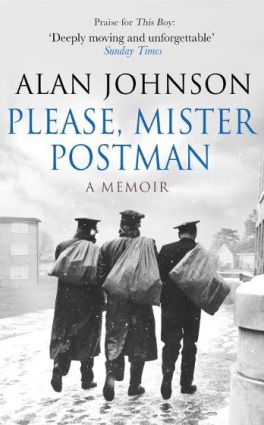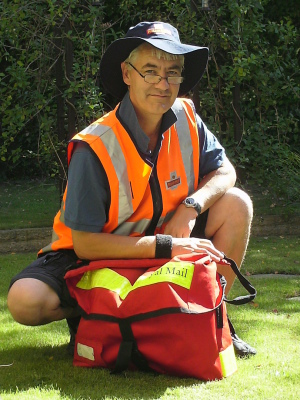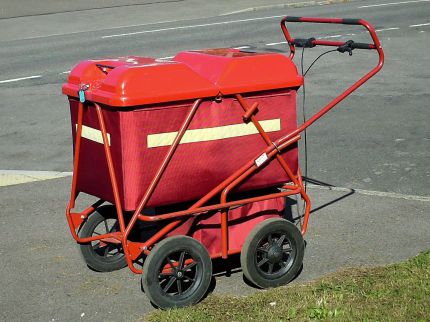
Please, Mister Postman
Author Alan Johnson was a trade union activist and Labour politician until retiring from politics in 2017. During a distinguished career both as a Trade Unionist and as a Labour politician serving in a number of senior cabinet posts.
Johnson lived on the Britwell housing estate near Slough from 1969 to 1987 working as a postman in the north Slough area. Johnson wrote memoirs of this period of his and his family’s life called Please Mister Postman which was published in 2014.
With Alan Johnson’s kind permission I am pleased to include some extracts from his book Please, Mister Postman in which he describes his and his family’s first experiences upon moving to the Britwell in 1969. Incidentally, I believe ‘the council’ that Alan refers to would be the London County Council, later to become the Greater London Council, who owned the Britwell Estate at the time.
‘We had received a letter from the council telling us that our house in Notting Hill was being compulsory purchased to be demolished. As my wife Judy and I had been the housing list for less than a year we would be given one offer, take it or leave it.
For us there was absolutely no prospect of being able to raise a deposit to buy a house, let alone meet mortgage repayments.
On a sunny June day in 1969 Judy and I were outside the station in Slough, Buckinghamshire. In my hand was a letter from London County Council offering us a council house on the Britwell estate, Slough.
‘Excuse me. Do you know how to the Britwell estate?’
The two Thames Valley policemen to whom my question was addressed were chatting beside their pale blue Ford Anglia. They looked at each other knowingly.
‘Do we know how to get to the Britwell?’ one of them said. ‘We should do, we go there often enough.’
The other one asked Judy why we were going there. Judy told him. ‘Well, I wouldn’t live there for all the tea in China’ was his helpful advice.
As we approached the estate, Judy nudged me to draw my attention to the view from the bus window: a community centre flanked by football pitches. On a long low brick wall at the back was painted, in huge letters, ‘Keep Britwell white’.
The house had two bedrooms with gardens front and back. The windows were boarded up to deter vandals and the grass was unkempt and over grown. Inside there was a long downstairs room running the width of the house, a snug kitchen, the bedrooms and a loft.
My mother had spent her entire adult life on the council waiting list, bringing up her children in barely habitable, multi-occupied slums. Her dream had been to have her own front door to a house like this. She had died, aged 42, still waiting. Now here we were, Judy and me, at the beginning of our married lives, with the chance to move straight into this solid, modern, well-appointed house. It was a chance we grasped with delight. We had no hesitation in accepting the one lifeline we had been given by the council. We would make the Britwell estate our home.’
‘My plan was to try to transfer with the Post Office. When I rang the Slough sorting office to inquire about vacancies, the guy I spoke to almost burst out laughing. They had more vacancies, apparently, than almost any other office in London and the south-east. When would I care to start?
Jobs were plentiful in Slough owing to the town’s thriving economy, which dated back to the 1920s, when the enormous trading estate was built on the site of a First World War vehicle depot. It was not only the first business park in Europe but, at almost 500 acres, remains the biggest to this day.
It was the impact on the town of this inter-war munitions dump that prompted John Betjeman’s infamous 1937 poem:
Come, friendly bombs, and fall on Slough
It isn't fit for humans now
There isn't grass to graze a cow
Swarm over, Death!
Although Betjeman’s intention was to lament industrialization and the blighting of England’s landscape in general, rather than Slough in particular, the mud has stuck, much to the continuing disgust of the townspeople. If Judy or I had read this before accepting the house on the Britwell, we might have thought twice about it. By the time we did read the poem I was able to appreciate it while disagreeing strongly with its specific reference to the town we were happy to call home. Having been born in a street that literally ‘wasn’t fit for humans’, I knew the difference between a place that was and one that wasn’t.’
* * *
Taking a break from Alan’s book I would like to share my own experiences working as a postman for Royal Mail, albeit via a contractor and in a very different era. My short career occurred in 2009.
I was recovering from stress at the time and my careers advisor suggested delivering letters might help my recovery especially, as at 5 hours a day, it would be part time. It wasn’t the only promise that was made and broken.
Sadly, once I was out delivering mail I enjoyed the work and enjoyed exchanging pleasantries with people. Packages from Amazon or Play.com were nice too as that usually meant that even in a tiny way I was adding to someone’s birthday or other celebration.
I was working 8-10 hours a day for 5 hours pay and feeling more stressed than ever. I went sick and finally packed it in a month later.
Did working for the Royal Mail affect my mental health?
That’s my trolley over there and I’m not on it. You decide.
Returning to Please Mr Postman. The next extract is just a few paragraphs further on from the previous and describes the moving in day. The ‘four of us’ refers to Alan, his wife Judy and their two little girls Natalie and Emma.
+ + +
‘On a glorious summer’s day, the four of us squeezed on to the bench seat next to the removal man, winding down the window to breathe in the warm air. The van drove along the Great West Road, past the glory of the Hoover Building, out beyond what we call London Airport and towards the rolling Chiltern Hills of Buckinghamshire. The A4 cuts straight through Slough High Street, lorries and vans dispersing shoppers who hurried across the main road, seeking sanctuary on the pavement as the traffic roared past.
When we arrived at our new home the van bumped up over the kerb of Long Furlong Drive on to the little green around which ten houses were nestled. The neighbours who had cars used the green as a convenient parking place so our removal man did the same, churning up the brown dust that was all that was left of the grass.
The council had assured us that the house would be ready but we found it still boarded up, with huge sheets of plywood bolted into the brick on either side of the windows to discourage vandals. It was already midday. One of our new neighbours told us that the council offices in Wentworth Avenue, five minutes’ walk away, would be open for another hour.
On my way to notify the council of our arrival I remembered the reaction of those two policemen who’d directed us here on our first visit to Slough. Walking the unfamiliar streets of Britwell, I tried to assess the level of danger; to sense, as I had as a kid in North Kensington, the trouble spots, the streets it was wiser to avoid. Nothing registered on my Richter scale. It felt like a peaceful village on a summer’s afternoon. Children played in the pleasant streets, men washed cars, women tended their front gardens or walked back from the Wentworth Avenue shops struggling with bags of groceries. The Britwell seemed to me to be more Arcadian than anarchic.
The council workmen came at about four o’clock to let in the light. The dismantling of the boards felt like a fitting relaunch of our lives; the sun flooding in a grand opening for our little house. As the long summer’s day began to fade, with Natalie and Emma asleep in their own room for the first time, Judy and I stood at the back door surveying the first garden either of us had ever had. We both felt disorientated but elated too. Perhaps the policemen who’d warned us off the Britwell had been locals dismayed by the influx of London council tenants on to their local patch. Whatever their reasons, they had been wrong. This was a Saturday night and yet there was silence except for the sound of television programmes filtering through the open windows of the houses that backed on to ours. We listened, like two anthropologists, to the comforting sounds of domesticity.’
+ + +
This abridged account was extracted with Alan Johnson’s kind permission from his book Please, Mister Postman published by Bantam Press, 2014.
Books by Alan Johnson are This Boy (2013), Please Mister Postman (2014), The Long and Winding Road (2016) and In my Life (2018). All are titles of Beatles songs.
The covers of Alan Johnson’s first three books
Alan Johnson
Early life
The son of Stephen and Lillian Johnson, Alan Arthur Johnson was born on 17 May 1950 in Paddington, London. Alan’s father left the family and his mother died when he was aged 13. Johnson was then brought up by his older sister Linda who was only 16 at the time. The two were assigned a council flat by their child welfare officer.
Johnson passed the eleven-plus exam and attended Sloane Grammar school in Chelsea, now part of Pimlico Academy. He left school at the age of 15 and worked stacking shelves at Tesco. At the age of 18 he became a postman. He enjoyed music and was a member of two groups.
His first band was called The Area and was formed with friend Andrew Wiltshire who was a drummer. It became a five piece band and the repertoire included a cover of the Rolling Stones hit ‘Time is on my side’ as well as hits by the Monkees, the Small Faces and the Troggs. They played gigs around West London. His second band was called the In Betweens and they made a record but it didn’t sell.
‘I can't imagine a life without music but I've stopped imagining a life within music. I have never recaptured the thrill of those days in a band and I never will. My only regret is that I didn't continue to play and write songs beyond my 20s.’
Parliamentary Career
Johnson joined the Union of Communication Workers, becoming a branch official. He joined the Labour Party in 1971. Johnson became a full-time union official in 1987 and General Secretary of the union in 1992. He became a member of Labour’s National Executive Committee.
Just before the 1997 General Election Johnson was selected to represent the constituency of Hull West and Hessle, a position he would hold for 20 years. He would hold several offices in government as well s in opposition and here is a summary:
MP for Hull West and Hessle
1 May 1997–3 May 2017
During the premiership of Tony Blair, leader of Labour Party
Minister for Higher Education
13 June 2003–8 September 2004
Secretary of State for Work and Pensions
8 September 2004–6 May 2005
Secretary of State for Trade and Industry
President of the Board of Trade
6 May 2005–5 May 2006
Secretary of State for Education and Skills
5 May 2006–28 June 2007
Secretary of State for Health
28 June 2007–5 June 2009
During the premiership of Gordon Brown, leader of Labour Party
Home Secretary
5 June 2009–11 May 2010
Harriet Harman acting leader of Labour Party and Ed Miliband
Shadow Home Secretary
11 May 2010–8 October 2010
Shadow Chancellor of the Exchequer
8 October 2010–20 January 2011
During the premiership of Gordon Brown, leader of Labour Party
Home Secretary
5 June 2009–11 May 2010
In opposition during Harriet Harman as acting leader of Labour Party and Ed Miliband
Shadow Home Secretary
11 May 2010–8 October 2010
Shadow Chancellor of the Exchequer
8 October 2010–20 January 2011
Personal life
Johnson is married to Carolyn Burgess but was previously married to first wife Judith Cox with whom he has a son and two daughters. His second wife was Laura Jane Patient who he married in 1991 and they have a son born in 2000.
His hobbies include music, tennis, reading, cooking, football and he supports Queens Park Rangers FC.
Alan Johnson has appeared on four episodes of the BBC TV current affairs comedy quiz show Have I got News for You as host in one episode and on Paul Merton’s team in the other three.
Alan Johnson’s fourth book, In my Life, is a memoir of his music and was published in 2018.
My name is Gary Flint. I'm author, photographer & illustrator for Postcards from Slough. If you wish to make any comments on the contents of the website please click on the ladybird below:
Gary Flint
08/03/1961 - 09/04/2019
Postcards from Slough is an independently funded website. We are open to offers of sponsorship from companies that have any connections to the town. To contact us please click on the ladybird below:
Chalvey Community Forum
Postcards from Slough is linked with a local action group the Chalvey Community Forum. The group liaises with various local organisations in order to improve the quality of life for residents in the ward of Chalvey and Salt Hill. To learn more please click on the maidenhair leaf below:
Museum of Berkshire Aviation
I volunteer as a guide at the Museum of Berkshire Aviation. It is a special museum and if you would like to know more about the museum then please click on the motif below:
To learn more about the museums activities while staying within this website click on the tab at the top of the page or on the motif below:
Graces Guide
Postcards from Slough uses some images from Grace's Guide. Click on the button below:
British Listed Buildings
Postcards from Slough contributes material to British Listed Buildings and uses the site for cross referencing purposes. Click on the button below:







